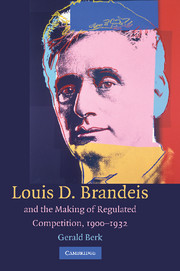Book contents
- Frontmatter
- Contents
- Figures and Tables
- Acknowledgments
- 1 Creative Syncretism
- PART I BRANDEIS AND THE THEORY OF REGULATED COMPETITION
- PART II REGULATED COMPETITION IN PRACTICE
- 5 Cultivational Governance at the Federal Trade Commission
- 6 Deliberative Polyarchy and Developmental Associations
- 7 From Collective Action to Collaborative Learning: Developmental Association in Commercial Printing
- PART III REGULATED COMPETITION CONTESTED
- PART IV CONCLUSION
- Appendix Industries and Number of Associations with at Least Substantial Involvement in Developmental Association, by Industry Group
- Index
6 - Deliberative Polyarchy and Developmental Associations
Published online by Cambridge University Press: 23 November 2009
- Frontmatter
- Contents
- Figures and Tables
- Acknowledgments
- 1 Creative Syncretism
- PART I BRANDEIS AND THE THEORY OF REGULATED COMPETITION
- PART II REGULATED COMPETITION IN PRACTICE
- 5 Cultivational Governance at the Federal Trade Commission
- 6 Deliberative Polyarchy and Developmental Associations
- 7 From Collective Action to Collaborative Learning: Developmental Association in Commercial Printing
- PART III REGULATED COMPETITION CONTESTED
- PART IV CONCLUSION
- Appendix Industries and Number of Associations with at Least Substantial Involvement in Developmental Association, by Industry Group
- Index
Summary
The Federal Trade Commission's efforts to cultivate deliberative polyarchy bore fruit in creative action in civil society. The cost accountants took up the commission's challenge to work with trade associations to upgrade competition through cost work and benchmarking. Many trade associations took up the FTC's challenge, and in doing so, they made the transition from cartel to developmental association. In 1918, the U.S. Chamber of Commerce took up where the FTC left off in 1916 and assembled cost accountants, trade associations, and managers to conceptualize developmental associations and make the form more widely available. By 1925, at least 25 percent of all trade associations, in 15 percent of all manufacturing industries, had participated in crafting developmental associations, with up to half that number instituting its features in whole or in part.
This chapter recounts the progress of developmental associations in manufacturing and deliberative polyarchy in peak and professional associations. It shows how trade associations, cost accountants, and the U.S. Chamber of Commerce discovered cost accounting and conceptualized developmental associations. Trade associations created cost accounting and collaborative learning from their efforts to share price information. Cost accountants discovered developmental associations after a battle with financial accountants and after they failed to impose methods of scientific management on their clients. The U.S. Chamber of Commerce was introduced to developmental associations by the state.
- Type
- Chapter
- Information
- Publisher: Cambridge University PressPrint publication year: 2009



